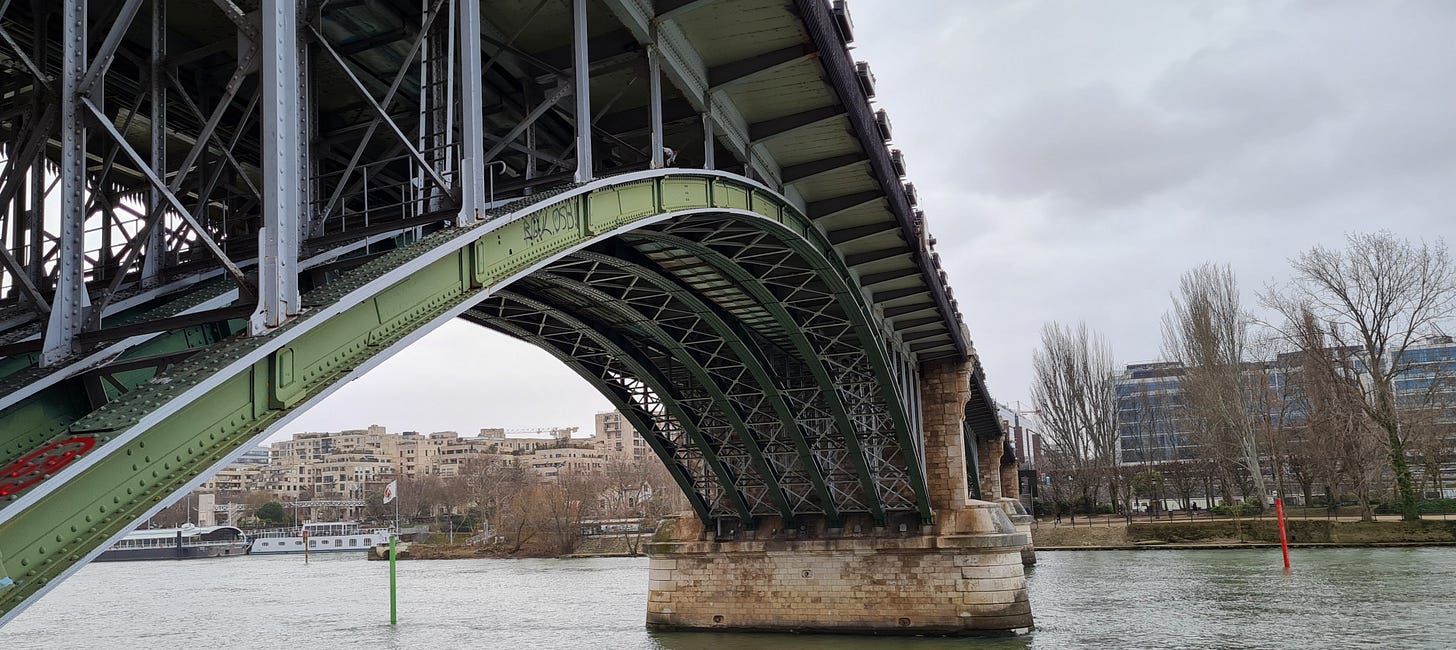Crossing the Styx, reversed
Issue #78 of your inbox poetry magazine
It's like crossing the Styx, but then reversed:
leave Tantalus and Sisyphus behind,
bid farewell to the damned, doomed and cursed,
and let Charon ferry you from the grind.
Turn west and drive, cross the Seine once, twice, thrice,
it's like crossing the Styx, but then reversed:
no more crowds, packed metros. No more high-rise.
Bid farewell to the damned, doomed and cursed.
To escape that race, all you have to do
turn west and drive, cross the Seine once, twice, thrice.
You'll find Eden, El Dorado. For you,
no more crowds, packed metros. No more high-rise.
And we'll be there waiting with all our charms
welcoming you home, with our open arms.
Creating something new is fun. That’s one of the reasons I have created a poetic form that I use a lot. But to grow, you also have to try new things, sharpen your skill with familiar ones, and experiment. This poem is a nice combination of all that. The new thing is a pantoum. I have published one in this magazine before. It’s a form I recently got to know, and that has its origins in Malaysia. Not far from where part of my roots are from, so that’s an added bonus.
The familiar form is the sonnet. That famed 14-line poetic form, with iambic pentameter and a strict rhyme scheme. The experiment is combining them and being a little bit flexible with the existing rules. There’s some room for improvement, probably, but I am quite satisfied with the result. And the process. I highly recommend doing something similar. Either with poetry, another form of art or craft, or in your work.
Try to combine new methods, with sharpening your skills on things you know and experiment to create something new. You might surprise yourself, too.
An ode to de-urbanising
The poem is also an ode to de-urbanising. For decades, maybe even centuries, the cities of our planet have pulled people in. Now, it’s like a magic trick. The cities pull all the attention to them, distracting us from all the beauty that happens outside of them. Sometimes even just outside. It takes the crossing of a bridge to find beauty, in a way. We lived in the Green Heart area of The Netherlands, just outside of the metropolitan area formed by the major Dutch cities. It was a blessing, especially in times of social distancing and isolation. Now we live just outside Paris. It is as if the space and the many green areas make people more relaxed, more calm, more kind. And, there is a lot to find here, too. Culture, nature, activities, sports. All you have to do, is look. I still love the big city, especially that one on the other side of the Seine, but there certainly are benefits of living in the Yvelines department with its rich history, nature and plenty of things to do.
What do you prefer?
Something to listen to
Earlier this week, we published Chapter 11 of our poetry podcast. This time we spoke to Raffaella Ferretti, an Italian multi-lingual poet. In the 9 minutes of our show, we talk about culture, the value of speaking more languages, music, poetry and more. There’s a poem, too! Listen now, on Apple podcasts, Google podcasts, Anchor.fm or just here below, via Spotify.
This week’s poem is, as usual, available in our audio collection the #trpplffct readings:
In February, we’re taking you on a trip through the 27 EU Member States. One song from each Member Sate. Listen now:
Poetry elsewhere
I have a deep fondness for what I call meta poetry. That’s poetry about (creating) poetry. This poem from Greg Zeck, How to Write a Found Poem, captivated me. I loved it, and hope you do, too.
Flowers provide such great images for use in poetry. The rose is maybe the most mentioned of all. Still, as this poem proves, there’s always a way to create a new use. Read Another Again.
In our podcast episode Chapter 8: Amy, guest poet Amy mentioned an Instagram account she follows that shares new takes on haiku. So, I started following it, too and found this for you: Color Love.



What a lovely poem! Thanks for sharing 🤩